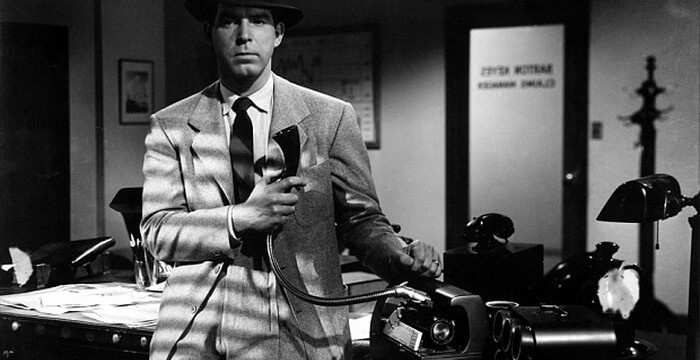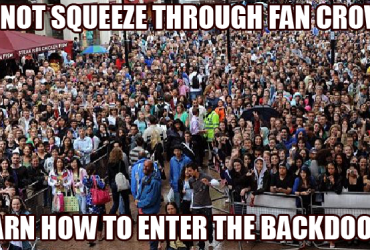Double Indemnity is the elusive case of the perfect noir. And yet it depicts a perfect crime that goes terribly awry. Perhaps that’s the whole point.
Think about it. More than the sardonic repartees of alluring temptresses and irreverent antiheroes, this genre had always been about shedding light on the darkest recesses of the human soul; about light peeking through venetian blinds in the dark, and moments of warmth wrestling their way out of the coldest of hearts; about the deceptively life-affirming lustre of imperfection and decadence; about instants of blinding determination that echo through our minds like a guiding light. To get film noir, a filmmaker needed to understand how those feelings, equally liberating as they are frightening, could at times move us beyond all convictions. Because they are not just literary clichés. They’re part of us all, small or big as it might be.
Few films have depicted that almost inexplicable frenzy of the moment so vividly, and so effortlessly. And yet you could even play that card against Billy Wilder’s majestic treatise on the frailty of human selfishness, and question it: how could witty and affable salesman Walter Neff suddenly turn into a cold and calculating murderer? How could he and Mrs. Dietrichson so inexplicably fall for each other, almost without any time for their precious few moments of intimacy to blossom into any kind of believable romantic chemistry? Where was the logic, the narrative plausibility in all that?
The answer is a lot simpler when you see the film as a portentous, intoxicating crescendo made of repressed guilt and short-sighted and self-serving pragmatism, human decadence that Austria-Hungary-born Billy Wilder and England-born Raymond Chandler might have blamed the American society of the time for. The point is not really how Walter ends up concocting the perfect crime, or how he and Phillys fall head over heels for each other as if in a state of trance. It’s why.
Why did they do it, what blinded them so vehemently as to risk everything for something they knew could, and possibly would go wrong? What could be so overpowering, if not that animalistic instinct that thankfully lies dormant to never be awaken in most of us. But not all.
Double Indemnity is the perfect noir because, above all things, it captures the decadent beauty and frailty of human weakness. It is, in a sense, a love story; not between two people whose true colors will be revealed throughout the course of the film in rather blunt and ruthless fashion, but rather between Walter and the father figure he always needed, his friend and colleague Keyes. It reads and plays out like the best of Hitchcockian mysteries, with Neff narrating his impending fate via a Dictaphone, as the events methodically unfold. And it’s also full of the sardonic thrills that the dialogue (by Chandler and Wilder) is filled to the brim with. But it is first and foremost as pure and triumphantly genuine a film noir as there has ever been one, with all its underlying pathos and air of impending doom laid bare.
Think of how hard it must have been to sneak this script out of the Hays Office relatively unscathed, what with all the unabashedly amoral little monsters populating it. So hard, in fact, that the original novella had shown up on many a Hollywood producer’s desk already by the mid 1930’s, when it was first published in Liberty magazine as an eight-episode serial. And yet it was branded as unfilmable right from the start. It was unfathomable that Joseph Breen and his ilk would allow such sordid and “audience-hardening” fare under the Production Code. It didn’t matter that it had been written by James M. Cain of The Postman Always Rings Twice, or that all the majors had entered a bidding frenzy to secure the rights to the novel.
Not even a rather conflictual relationship between Wilder and Chandler could rock this boat; nor could casting diva Barbara Stanwyck (donning a suitably sleazy and phony-looking blonde wig) and comedy mainstay Fred MacMurray against type, not to mention having the brilliant Edward G. Robinson play second fiddle to the leading duo, at least in theory (he was paid the same, and arguably left an even bigger impression than MacMurray or Stanwyck).
In its best moments, this film taps into fatal and fateful imperfection which gave birth to this genre, perhaps as a reaction to all the social upheaval following the war and the Great Depression, and likely influenced by German Expressionism. More than an innocent feeling of affinity, Walter and Phyllis are moved by a morbid, frantic ethical mist induced by selfishness and human frailty. They bask in it until it devours them both, in a finale that could only please the Hays Office, although paradoxically is more implicitly telling than any final denouement the Office might have nixed (including the now famous gas chamber scene).
And, if there ever was the need to do so, it proved how versatile a filmmaker Wilder was, in one of his crowning achievements.
DOUBLE INDEMNITY
A film by Billy Wilder
Starring Fred MacMurray, Barbara Stanwyck, Edward G. Robinson, Porter Hall
Screenplay by Raymond Chandler and Billy Wilder (based upon James M. Cain’s Double Indemnity)
Produced by Paramount Pictures
Want to know more about what we do? Sign up to learn more about our process, our projects, and upcoming premieres.
 Follow this developing story through our social media on Twitter, Facebook, Google+, Pinterest, Tumblr, Instagram, Goodreads.
Follow this developing story through our social media on Twitter, Facebook, Google+, Pinterest, Tumblr, Instagram, Goodreads.







Leave a Reply